 Takyeh Dowlat by Kamal-ol-Molk | |
| Location | Tehran, Persia (Iran) |
|---|---|
| Coordinates | 35°40′42.65″N 51°25′15.93″E / 35.6785139°N 51.4210917°E |
| Owner | Royal court of Persia (Qajar dynasty) |
| Genre(s) | Theatre Ta'zieh First Constituent assembly of Persia (Iran) |
| Construction | |
| Opened | 1868 |
| Demolished | 1946 |
| Architect | Hossein-Ali Mehrin |
Takyeh Dowlat (Persian: تکیه دولت lit. "State Theater") was a Royal Theater in Tehran, Iran. It was the most famous of all the ta'zieh performance spaces, for the Mourning of Muharram. It has a capacity for more than 4,000 people. Built in 1868[1] by Naser al-Din Shah Qajar south-east of the Golestan Palace on the site of the Síyáh-Chál, the Royal Theater's sumptuous magnificence surpassed that of Europe's greatest opera houses in the opinion of many Western visitors.[2] It is comparable to Verona Arena, Samuel Greene Wheeler Benjamin told at his first visit.
Karim Pirnia has introduced Hossein-Ali Mehrin as the architect of this building.[3]
Notable events
It was here that Reza Shah proclaimed the downfall of the Qajar dynasty.[4] The Tekyeh was destroyed in 1947 and a bank building was constructed on the site.[5]
Gallery
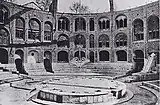
 Takyeh Dowlat adjacent to Bād gīr Mansion in Golestan Palace
Takyeh Dowlat adjacent to Bād gīr Mansion in Golestan Palace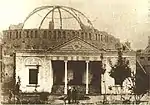 Main Entrance
Main Entrance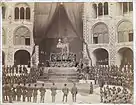 Naser al-Din Shah Qajar's Funeral at Takyeh Dowlat
Naser al-Din Shah Qajar's Funeral at Takyeh Dowlat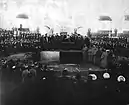 Reza Shah Oath at Constituent assembly
Reza Shah Oath at Constituent assembly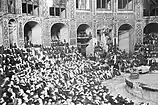 Spectators at Takyeh Dowlat
Spectators at Takyeh Dowlat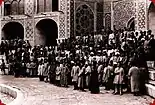
References
- ↑ Abbas Amanat. Pivot of the universe: Nasir al-Din Shah Qajar and the Iranian Monarchy, p. 435.
- ↑ "TA'ZIA". Encyclopedia of Iranica. Retrieved 2010-06-15.
- ↑ Mohammad Karim Pirnia, Sabk Shenasi Mi'mari Irani (Study of styles in Iranian architecture), M. Karim Pirnia. 2005. ISBN 964-96113-2-0 pp.134-135
- ↑ Saeed Alizadeh, Alireza Pahlavani, Ali Sadrnia. Iran: a chronological history . p. 197.
- ↑ The world encyclopedia of contemporary theatre, Volume 3 edited by Don Rubin, p. 215.
35°40′42.65″N 51°25′15.93″E / 35.6785139°N 51.4210917°E